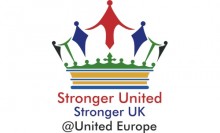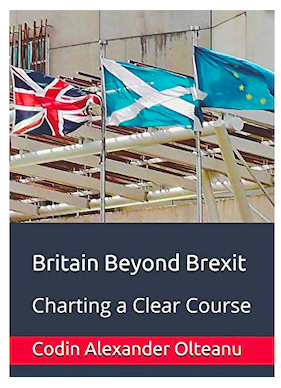Although Vladimir Putin's Russia also favors the emergence of a global balance of power between the 21st century's major players, its interests regarding the European Union are diametrically opposed to those of China. President Putin is on record declaring that the collapse of the Soviet Union in 1991 was the 20th century’s greatest geopolitical disaster. Given the cataclysmic events that have marked European and world history between 1914 and 1945, that is a significant pronouncement. Based on his view of the international order and of Russia's role within it, the fundamental aim of President Putin's foreign policy is to reintegrate Russia's ‘near abroad’ referring to the Soviet Union's former republics as well as its former Eastern European satellite states in its sphere of influence and rebuild Russia as a major global superpower capable of dealing on equal terms both with the United States’ economic and military influence and with China’s rising power. In order for this to happen however it is critical for President Putin that the European Project - comprising both NATO and the European Union - collapse in itself and leave Europe not as an autonomous international actor and a full member of the global balance of power partnering the United States, but simply as a field of battle dominated by Russia, where it can expand its diplomatic, economic, and military influence without being hindered by any common, coherent, and effective European policies in these fields or any US interference economic or military interference on this side of the Atlantic – in effect reviving the old Soviet policy of “decoupling” Europe from the USA.
If President Xi Jinping sees parallels between Bismarck's Imperial Germany and today's China, President Putin has developed an affinity with 19th Century Austria’s Prince Klemens von Metternich who, for three decades between the 1815 Vienna Congress and the 1848 European “Spring of Nations” was able to shape the European balance of power to Austria's advantage and keep his country as the dominant player on the European continent. A key in achieving this aim was Metternich's determined opposition to all national movements that would have speeded up Austria's disintegration - and in particular any progress towards Italian unity that would have endangered Austria's dominance of northern Italy with its vital ports and its important economic and cultural centers north of the river Po. Metternich said in effect that Italy must remain nothing else but a geographic designation but never a political one:
“The word 'Italy' is a geographical expression, a description which is useful shorthand, but has none of the political significance the efforts of the revolutionary ideologues try to put on it, and which is full of dangers for the very existence of the states which make up the peninsula.”
One only has to replace one word –Italy– with another –Europe– to encapsulate exactly President Putin’s current strategy towards the European Union. He aims to see it disintegrate politically, economically, and militarily so as to allow Russia to regain its lost influence in eastern and central Europe and to use the economic and technological dynamism of western Europe to strengthen Russia's own performance in these areas so as to help it to regain its status of a global superpower. To achieve this President Putin - contrary to his Austrian role model - is actively using hyper-nationalist forces in EU member states to undermine the EU supranational project by funding both right-wing and left-wing populist parties whose aim is to repatriate to national levels of government powers now exercised by the European or trans-Atlantic levels of governance and thus to do their outmost to see both the European Union and NATO disintegrate in favor of reinvigorated national governments, each pursuing its own national interests in Europe and on the global stage. Transforming Europe in a purely geographical term devoid of any political significance is thus President Putin’s key strategic goal on the road to restoring Russia’s status as a global superpower.
Just as President Xi Jinping and President Obama are cognizant of the critical importance of a united, coherent, legitimate, and effective European Union for their own political projects, so is President Putin persuaded of the necessity to accelerate the implosion of the European Project in both its European Union and NATO dimensions. If Russia is to regain its former status of global superpower and its dominance over the European continent, Britain’s exit from the European Union represents for Putin put a very important step in this process of European fragmentation and implosion that represents the most important aspect of his global strategy of Russian resurgence.
Of course President Putin’s aims and views on Europe are now no longer a secret –if they ever were– and have been discussed in public by any number of German, French, British, and US politicians and commentators as well as by senior NATO officials and military figures. It is highly ironic therefore that the importance David Cameron gives on one hand to a firm stand against Russian aggressive expansionary policies in the Ukraine, Eastern Europe, the Caucuses and Central Asia and his assertions that the United Kingdom must continue to play a critical role in blocking these ambitions of the Russian leader are mirrored on the other hand by an entirely opposite British internal politics ‘strategy’ resulting in the upcoming Brexit referendum that will endanger the EU's future existence as well as Britain's unity and its ability to play any meaningful role in the future to block Putin Russia's plans to again dominate the Old Continent.
With Britain's exit from the EU and a likely Scottish independence vote putting an end to the 300-year-old union between the two British neighbors, President Putin hopes to see a significant weakening of NATO as the United States - disillusioned yet again with its ‘free-rider’ European allies and especially with Britain - retrenches itself on the other side of the Atlantic and allows Russia to pursue unimpeded its strategic goals in Europe and the Middle East. This explains why President Putin has only had laudatory comments at the address of Donald Trump who is today the main opponent of neo-conservative strategies advocating for the USA to go on projecting its military power internationally at the expense of needed reform projects at home; and why Trump in turn clearly admires the Russian president as a ‘strong leader’, and is willing to work with him when necessary to “bomb the hell out of ISIS” and to allow him to pursue what he sees as ‘rational’ Russian strategic national interests in a wide tri-continental arc stretching from its frontier with Norway close to the Arctic Circle across Europe, North Africa, and western Asia all the way to the Indian Ocean and the Equator.
The only way for Britain to hem in Putin Russia's new imperialist expansionary tendencies is to ensure that European Project is renewed both by strengthening a legitimate, coherent, and effective European Union and by reinvigorating NATO and the military commitment of each of its members to collective defense and collective security against all common threats and common enemies. The critical first step in doing so is voting by an overwhelming margin to remain in the European Union at the 23. June 2016 Brexit referendum. Defence Secretary Michael Fallon confirmed this analysis almost verbatim in a February 2016 article in the Sunday Telegraph, where he stated that Russian President Vladimir Putin wants Britain to leave the European Union:
"It is not scaremongering to ask which result Putin would favor. If we left, the European Union for the first time in its history would be smaller and weaker. That's obviously in Russia's interests".

